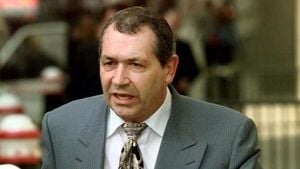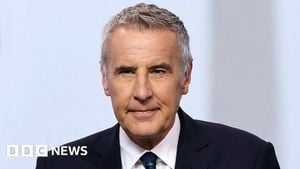David Howell Evans, better known as The Edge, the iconic guitarist of the legendary rock band U2, has officially become an Irish citizen. The ceremony took place on Monday, June 23, 2025, in Killarney, County Kerry, marking a monumental day not only for Evans but also for approximately 7,500 other new citizens from over 143 countries who were conferred citizenship across seven ceremonies over two days.
Born in Essex, England, to Welsh parents, The Edge moved to Ireland when he was just one year old. Despite living in Ireland for more than six decades, it was only now, at the age of 63, that Evans chose to formalize his long-standing connection to the country by becoming an Irish citizen. "I'm a little tardy with the paperwork," he admitted during the ceremony, reflecting on the delay. "But the time is right. And I couldn't be more proud of my country for all that it represents and all that it is doing."
Sporting his trademark woolly cap and an Irish tricolour clip on his lapel, Evans described the occasion as "a monumental day for all of us" and "an amazingly joyful event." The ceremony was held in the Gleneagle Arena, where hundreds of applicants swore an oath of fidelity and loyalty to the Irish state alongside Evans. The event was not only a personal milestone but also a significant moment for Ireland, which continues to welcome new citizens from diverse backgrounds.
The Edge expressed that the timing of his citizenship felt especially meaningful due to Ireland's current global role. "Because of what is going on in the world right now, what Ireland stands for, it's very powerful," he said. "We are talking really about showing leadership in the world, supporting our international bodies, the ICC, UN, speaking truth to power. Really important what Ireland is representing right now." This statement highlights Ireland's commitment to multilateral organizations such as the International Criminal Court and the United Nations, positioning the country as a beacon of leadership and moral authority on the international stage.
Evans’s journey with U2 began in 1976, when he and his Dublin classmates Paul Hewson (Bono), Larry Mullen Jr., and Adam Clayton formed the band. U2 has since become one of the world’s most influential rock groups, known not only for their musical innovation but also for their political activism. Songs like "Sunday Bloody Sunday" shed light on the tragic shooting of unarmed protesters in Londonderry in 1972 by British soldiers, while "New Year's Day" became associated with the Polish Solidarity movement. "Pride (In The Name Of Love)" paid tribute to civil rights leader Martin Luther King Jr., underscoring the band’s dedication to social justice and peace.
The band’s advocacy extended beyond music. They played a notable role in supporting the Belfast/Good Friday Agreement in 1998, which was a pivotal step toward peace in Northern Ireland. Just last month, in May 2025, U2 performed "Sunday Bloody Sunday" at the Ivors award ceremony in London, blending their music with a powerful call to "stop war." This performance coincided with the band becoming the first Irish songwriters to receive an academy fellowship, marking the 70th anniversary of the prestigious awards.
Despite their global success, The Edge and his bandmates have maintained a deep connection to Ireland. Adam Clayton, also born in England, moved to Ireland in 1965 and became an Irish citizen in 1989, further illustrating the band members' ties to their adopted homeland.
The citizenship ceremonies in Kerry attracted applicants from a wide array of professions and origins, including shop assistants, meat plant workers, and financiers. The largest groups among the 7,500 new citizens hailed from India (1,888), Brazil (817), the UK (516), the Philippines (480), Romania (470), and Poland (396). The Minister for Justice, Home Affairs and Migration, Jim O’Callaghan, emphasized the significance of the occasion, stating, "It is a great privilege to become a citizen of this country and obviously with it comes responsibilities and duties, and I think everyone who is taking on citizenship will be aware of that."
O’Callaghan’s remarks came amid a backdrop of rising immigration debates and protests in Ireland and across Europe. Just days before the ceremony, thousands gathered in Dublin to voice concerns over immigration, with some protesters carrying banners declaring "Ireland is full" and others wearing caps emblazoned with "Make Ireland Great Again." These tensions underscore the complex and often contentious nature of citizenship and national identity in modern Ireland.
For The Edge, however, the decision to become an Irish citizen transcends politics. It is a deeply personal affirmation of his identity and lifelong connection to Ireland. "Honestly, there were many moments in the past when I could have done it with just the form to be filled out, but I’m happy it’s now," he reflected. "It feels more significant, it feels more meaningful."
His words resonate with a broader sense of pride and loyalty, not only to the country he has called home since infancy but also to the values Ireland represents on the world stage. "I have always felt Irish, Ireland will always be home to me and I’m so grateful for that," he said. "It couldn’t come at a better moment for me so I am just so happy to be at this point, to be in even deeper connection with my homeland."
The ceremony in Killarney was a vivid reminder of Ireland’s evolving national tapestry, woven from diverse cultures and stories, all unified by a shared commitment to the Irish state. For The Edge, this moment closes a long chapter of waiting and opens a new one of belonging and identity, both personal and public.





